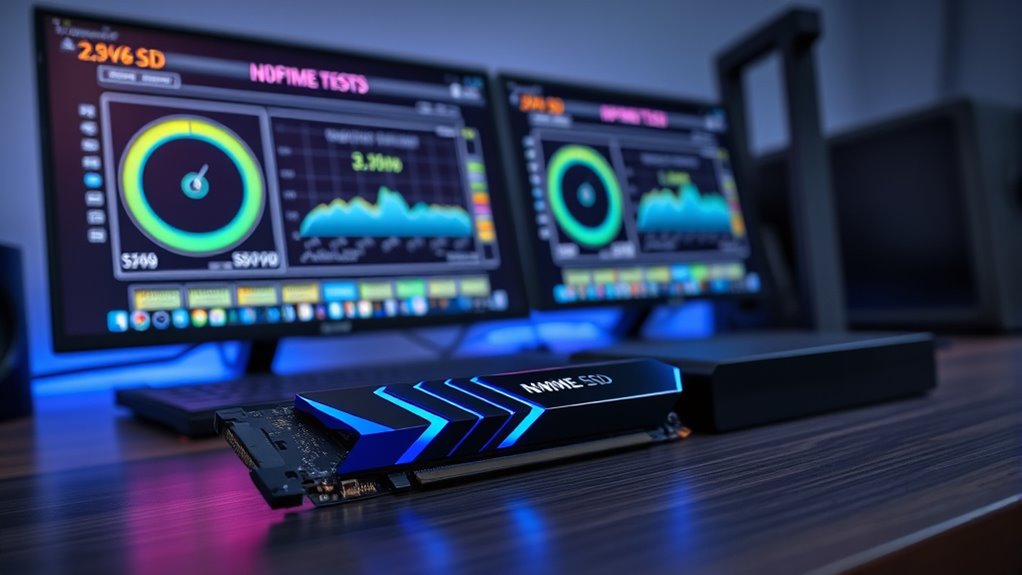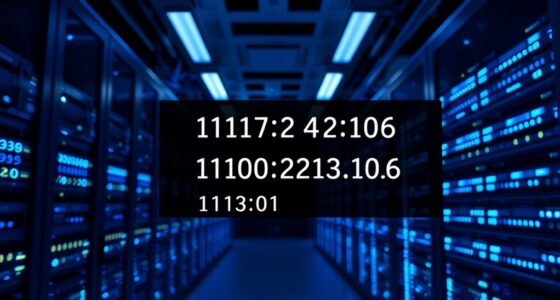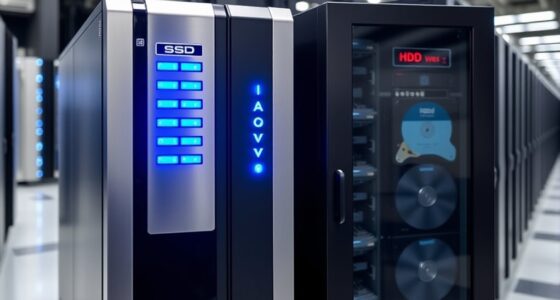If you compare NVMe and SSD VPS storage, you’ll see that NVMe drives deliver speeds three times faster or more, thanks to their direct PCIe connection, which reduces bottlenecks. This means quicker load times, faster data transfers, and better overall performance for demanding applications. While SSDs are reliable and simpler, NVMe offers a huge boost if speed is your priority. Keep exploring to discover how these differences can impact your specific needs and setup.
Key Takeaways
- NVMe drives leverage PCIe for significantly faster read/write speeds than SATA or SAS SSDs.
- Speed tests show NVMe can outperform traditional SSDs by three times or more.
- NVMe is ideal for high-traffic applications, database tasks, and data-intensive workloads.
- SSDs offer reliable performance with simpler security features suitable for less demanding setups.
- Choosing between NVMe and SSD depends on workload speed requirements and security considerations.

When choosing VPS storage solutions, understanding the difference between NVMe and SSD options is essential. Both types profoundly impact your server’s performance, but they also influence your approach to cloud security and data redundancy. NVMe drives are designed to leverage the PCIe bus, offering faster read/write speeds compared to traditional SSDs that connect via SATA or SAS interfaces. This speed difference isn’t just about raw numbers; it translates into quicker application load times, faster data processing, and more responsive user experiences. As you evaluate your storage needs, keep in mind that NVMe’s superior performance can reduce bottlenecks and improve overall system efficiency. Additionally, the technology behind NVMe drives allows for more efficient parallel data processing, further boosting performance.
However, speed isn’t the only factor to weigh. Cloud security remains a top priority when selecting storage solutions. NVMe drives, while faster, may require more advanced security protocols due to their high throughput capabilities, which can be exploited if not properly protected. Guaranteeing robust encryption and access controls becomes essential, especially when handling sensitive or regulated data. SSDs, though slightly slower, often come with mature security features that can simplify compliance and data protection efforts. Regardless of your choice, implementing strong data redundancy strategies is essential. Data redundancy ensures that your information remains safe even if a drive fails or data gets corrupted. Many cloud providers offer built-in redundancy options, such as RAID configurations or off-site backups, which you should leverage to mitigate risks associated with hardware failures.
Speed tests reveal that NVMe drives outperform SSDs in almost every metric, sometimes by a factor of three or more. These results mean faster database queries, quicker backups, and more efficient handling of high-traffic applications. But don’t overlook the importance of cloud security and data redundancy in this equation. Fast storage can’t compensate for a lack of proper security measures or inadequate redundancy plans. If your workload involves sensitive customer information or critical business data, investing in NVMe might be worthwhile for its speed benefits, but only if you also prioritize security protocols and redundancy strategies. On the other hand, SSDs can still deliver reliable performance with simpler security implementations and sufficient redundancy, making them a solid choice for less demanding environments.
Frequently Asked Questions
Can NVME or SSD VPS Storage Handle High Concurrency Workloads Effectively?
You wonder if NVME or SSD VPS storage can handle high concurrency workloads effectively. Both options offer excellent storage scalability and fast data transfer speeds, making them suitable for demanding tasks. NVME drives excel with lower latency, while SSDs provide broad hardware compatibility. Your choice depends on your specific needs, but rest assured, both can support high concurrency workloads efficiently if configured properly.
How Does Storage Type Impact VPS Pricing and Overall Value?
While the true cost of storage may seem straightforward, it’s often a nuanced journey. NVMe offers faster speeds and better upgrade flexibility, but it can come with a higher price tag, impacting your overall value. SSDs tend to be more budget-friendly, providing solid performance for less. Your decision should balance cost analysis and future needs, ensuring you choose a storage type that aligns with both your budget and growth plans.
Are There Specific Use Cases Where SSD Outperforms NVME?
You might find that SSD outperforms NVMe in certain enterprise applications and when dealing with legacy hardware. If your workload involves compatibility with older systems or less demanding tasks, SSDs can be more cost-effective while still offering reliable performance. For example, traditional database servers or backup solutions often benefit more from SSDs, as they provide sufficient speed without the complexity and higher cost of NVMe drives.
What Are the Long-Term Durability Differences Between NVME and SSD?
Think of your storage like a garden—over time, some patches get worn out faster. NVMe and SSDs both use wear leveling to extend lifespan, but NVMe drives typically have higher endurance due to better controllers and NAND quality. Data retention remains strong in both, but NVMe’s advanced technology generally offers better long-term durability. So, if longevity matters, NVMe could be your more resilient choice.
How Do NVME and SSD VPS Compare in Power Consumption?
When comparing NVMe and SSD VPS, you’ll notice differences in power efficiency and energy consumption. NVMe drives tend to use more power due to their high-speed performance, which can lead to increased energy consumption under heavy workloads. However, they’re often more efficient during bursts of activity. SSDs generally consume less energy overall, making them a better choice if you prioritize lower power use and energy efficiency for your VPS needs.
Conclusion
Don’t assume NVMe always wins—SSD VPS storage can still meet your needs at a lower cost. While NVMe offers blazing speeds, SSDs deliver solid performance for most users and are more budget-friendly. If your workload isn’t heavily intensive, SSD might be all you need, saving you money without sacrificing too much performance. So, consider your specific needs carefully before choosing—sometimes, the familiar SSD is the smarter, more practical choice.









